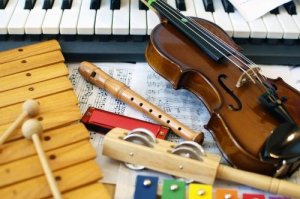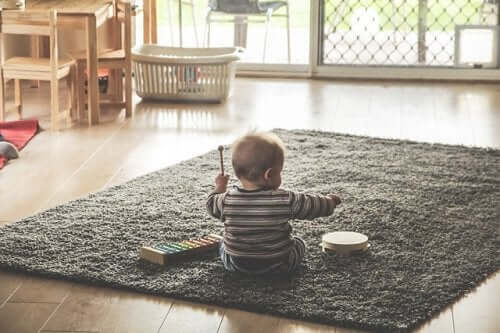The Importance of Musical Expression

The importance of musical expression lies, precisely, in its educational capacity. This is because music is culture, and it’s a means of communication. Through music, culture is passed down from generation to generation. It consists of a language through which humans can express feelings and experiences.
Therefore, musical expression contributes to a person’s holistic development. It allows both children and adults to develop their senses and their musical sensitivity, as well as channel their emotions.
Music education
From a child’s initial educational stages, the learning of music should aim to develop the senses. It should focus especially on the senses related to musical perception, like hearing, sight, and touch. In later educational stages, music education can involve objectives like theoretical learning like how to read and write music.
The learning of musical language allows for the development of abilities related to perception and the recognition of rhythms and sounds. At the same time, it also contributes to the development of abilities like singing, body movement, and the use of musical instruments.

So, in an educational context, music education should teach aspects related to the elements that define musical language. These include, for example, sounds, silence, rhythm, and melody. However, it should also include activities that involve exercising the voice and body. These are the basic tools of musical expression.
At the same time, as a form of expression, the learning of musical language allows people to develop the capacity to interpret and communicate the way in which they see and understand the world.
So, music education aimed at the global formation of subjects should be organized so that people can feel, enjoy and express music. As a means of shaping one’s personality and as a means of managing one’s emotions.
Resources for musical expression
During childhood, play should be at the center when it comes to teaching musical expression. Activities should allow children to experience pleasure through music. What’s more, they should motivate children to pay attention, discover musical elements, and improve their auditory capacities. Suitable activities include:
- Songs and dances with marked rhythms that encourage children to move their bodies and produce gestures. This contributes to both fine and gross motor development. It also improves coordination, balance, and body schema.
- The utilization, exploration, and manipulation of age-appropriate musical instruments. These may be percussion instruments, like tambourines, drums, cymbals, etc.
- The use of one’s own body, clapping, whistling and marching to express sounds and keep a rhythm.
- The guessing and differentiation of sounds and noises from daily life.
- Exposure to different musical genres, especially those that represent popular culture and folklore.
“Music is the art of organizing a coherent combination of sounds and silences using the fundamental principles of melody, harmony and rhythm, through the intervention of complex psychoanimic processes.”

The importance of musical expression in personal development
The learning of musical language is fundamental in the global development of both children and adults. Music contributes to cognitive development, logical thought and reasoning, and psychomotor development. It also has a role in emotional, social, and aesthetic development.
Musical expression helps us to experience, comprehend and manage our emotions. This helps maximize our emotional intelligence and improves our relationships with others. This, in turn, improves our quality of life.
Furthermore, music isn’t just a way to communicate and express different moods. It’s also a means of creativity because, on many occasions, music expresses what we can’t put into words.
The importance of musical expression lies, precisely, in its educational capacity. This is because music is culture, and it’s a means of communication. Through music, culture is passed down from generation to generation. It consists of a language through which humans can express feelings and experiences.
Therefore, musical expression contributes to a person’s holistic development. It allows both children and adults to develop their senses and their musical sensitivity, as well as channel their emotions.
Music education
From a child’s initial educational stages, the learning of music should aim to develop the senses. It should focus especially on the senses related to musical perception, like hearing, sight, and touch. In later educational stages, music education can involve objectives like theoretical learning like how to read and write music.
The learning of musical language allows for the development of abilities related to perception and the recognition of rhythms and sounds. At the same time, it also contributes to the development of abilities like singing, body movement, and the use of musical instruments.

So, in an educational context, music education should teach aspects related to the elements that define musical language. These include, for example, sounds, silence, rhythm, and melody. However, it should also include activities that involve exercising the voice and body. These are the basic tools of musical expression.
At the same time, as a form of expression, the learning of musical language allows people to develop the capacity to interpret and communicate the way in which they see and understand the world.
So, music education aimed at the global formation of subjects should be organized so that people can feel, enjoy and express music. As a means of shaping one’s personality and as a means of managing one’s emotions.
Resources for musical expression
During childhood, play should be at the center when it comes to teaching musical expression. Activities should allow children to experience pleasure through music. What’s more, they should motivate children to pay attention, discover musical elements, and improve their auditory capacities. Suitable activities include:
- Songs and dances with marked rhythms that encourage children to move their bodies and produce gestures. This contributes to both fine and gross motor development. It also improves coordination, balance, and body schema.
- The utilization, exploration, and manipulation of age-appropriate musical instruments. These may be percussion instruments, like tambourines, drums, cymbals, etc.
- The use of one’s own body, clapping, whistling and marching to express sounds and keep a rhythm.
- The guessing and differentiation of sounds and noises from daily life.
- Exposure to different musical genres, especially those that represent popular culture and folklore.
“Music is the art of organizing a coherent combination of sounds and silences using the fundamental principles of melody, harmony and rhythm, through the intervention of complex psychoanimic processes.”

The importance of musical expression in personal development
The learning of musical language is fundamental in the global development of both children and adults. Music contributes to cognitive development, logical thought and reasoning, and psychomotor development. It also has a role in emotional, social, and aesthetic development.
Musical expression helps us to experience, comprehend and manage our emotions. This helps maximize our emotional intelligence and improves our relationships with others. This, in turn, improves our quality of life.
Furthermore, music isn’t just a way to communicate and express different moods. It’s also a means of creativity because, on many occasions, music expresses what we can’t put into words.
All cited sources were thoroughly reviewed by our team to ensure their quality, reliability, currency, and validity. The bibliography of this article was considered reliable and of academic or scientific accuracy.
- Díaz, M. (2004). La educación musical en la etapa 0-6 años. Revista electrónica de LEEME, (14). Recuperado de https://ojs.uv.es/index.php/LEEME/article/view/9750/9184
This text is provided for informational purposes only and does not replace consultation with a professional. If in doubt, consult your specialist.








